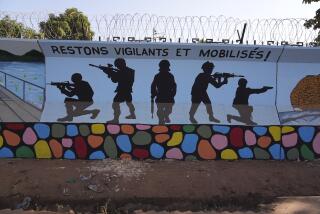Thinking the Unthinkable : Yes, U.S. intervention in Liberia may be the best humanitarian move
- Share via
The horrifying massacre of at least 600 refugees, including women and small children who had taken refuge in a Monrovia church, is confirmation that Liberia stands on the brink of anarchy. The European Community’s ambassadors have characterized the situation as “national suicide.”
The killings occurred Sunday, and were carried out by troops loyal to the tottering Liberian strongman Samuel Doe. His control of the country, which at present is being contested by insurgents directed by two feuding rebel leaders, now is restricted to portions of the capital. Unfortunately, the Lutheran church in which some 2,000 Liberians had taken refuge from the fighting was within that zone of control. According to witnesses, soldiers from Doe’s Krahn tribe burst into the church and turned automatic weapons, knives and swords against the civilians, who were members of the Gio and Mano tribes. Liberia was founded in 1847 by freed American slaves, but tribalism remains a strong and divisive force.
Doe denied that the atrocities were perpetrated by his troops. Monday afternoon, however, the U.S. State Department said that it was convinced that government soldiers were responsible. A department spokesman said American officials would be “discussing this with the government.”
They may have to do more than that. A U.S. naval task force with 2,000 Marines aboard is cruising off the Liberian coast. Monday, both the White House and the State Deparment were quick to say that no intervention was contemplated “at this point.”
This point, however, may very quickly give way to a worse one. Recent history is replete with examples--not only African--in which the breakdown of civil order gives way to murderous tribal strife.
One of the rebel leaders, Prince Yormie Johnson, already has appealed for intervention by the Marines. Washington is understandably reluctant to comply. But distasteful as such a step might be, its difficulties are outweighed by America’s historical and human obligations to the people of the only other country in the world in whose founding we had a direct hand.
More to Read
Sign up for Essential California
The most important California stories and recommendations in your inbox every morning.
You may occasionally receive promotional content from the Los Angeles Times.













